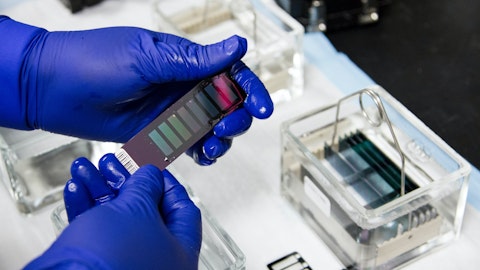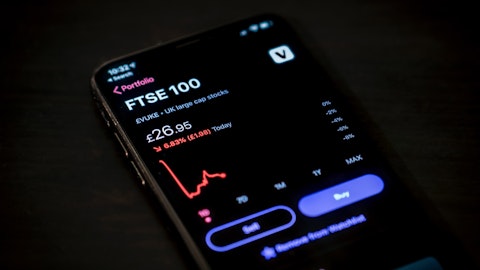In this article, we discuss 5 best FTSE dividend stocks to buy now. If you want to see more stocks in this selection, check out 10 Best FTSE Dividend Stocks To Buy Now.
5. Unilever PLC (NYSE:UL)
Number of Hedge Fund Holders: 21
Dividend Yield as of October 14: 4.32%
Unilever PLC (NYSE:UL) is a London-based fast-moving consumer goods company. It operates through Beauty & Personal Care, Foods & Refreshment, and Home Care segments. On August 3, Unilever PLC (NYSE:UL) declared a $0.4343 per share quarterly dividend. The dividend was distributed to shareholders on September 1. Unilever PLC (NYSE:UL) is one of the best FTSE dividend stocks to invest in.
On September 29, Morgan Stanley analyst Pinar Ergun initiated coverage of Unilever PLC (NYSE:UL) with an Equal Weight rating and a $42.75 price target. The analyst believes investors are largely favoring Unilever PLC (NYSE:UL) in the food sector but will be looking to see growth in the coming quarters in order to turn more optimistic on the stock.
According to Insider Monkey’s Q2 data, 21 hedge funds were bullish on Unilever PLC (NYSE:UL), compared to 23 funds in the last quarter. Tom Russo’s Gardner Russo & Gardner is the largest stakeholder of the company, with approximately 7 million shares worth $319 million.
Here is what Mayar Capital specifically said about Unilever PLC (NYSE:UL) in its Q2 2022 investor letter:
“In 1895 the Lever brothers created a new brand of hand soap. Inspired by the growing demand for hygiene products, the Lifebuoy brand of soaps was launched to ‘make health infectious’. 128 years later the Lifebuoy brand continues as a leading soap brand – albeit without the coal tar-derived ingredients list. In fact, the market research firm Kantar ranked Lifebuoy as the global #3 most chosen FMCG brand in 2020, just below Coca-Cola (KO) and Colgate (CL) – an astonishing fact given the age of the brand. While the brand is largely absent from shelves here in the UK, it is a juggernaut in Asian markets, and is the #1 brand in India.
There are two observations about the Lifebuoy story which tell us a lot about Unilever PLC (NYSE:UL), which is currently our largest holding in the Fund.
The first is the enduring power of brands in the consumer goods market. According to Kantar’s list of most chosen brands, the top 20 global marques have an average age of 116 years, with over half being founded in the 19th century. Fashions come and go, but there is something special about low-cost consumable goods that advantages strong, time-worn brand names…” (Click here to view full text)
4. BP p.l.c. (NYSE:BP)
Number of Hedge Fund Holders: 27
Dividend Yield as of October 14: 4.71%
BP p.l.c. (NYSE:BP) was founded in 1908 and is headquartered in London, the United Kingdom. BP p.l.c. (NYSE:BP) engages in the energy business worldwide, operating through Gas & Low Carbon Energy, Oil Production & Operations, Customers & Products, and Rosneft segments. BP p.l.c. (NYSE:BP) is one of the premier FTSE dividend stocks. The company delivers a dividend yield of 4.71% as of October 14.
On October 13, JPMorgan analyst Christian Malek raised the price target on BP p.l.c. (NYSE:BP) to 530 GBp from 520 GBp and maintained a Neutral rating on the shares.
Among the hedge funds tracked by Insider Monkey, 27 funds reported owning stakes worth $1.7 billion in BP p.l.c. (NYSE:BP) at the end of June 2022, compared to 27 funds in the prior quarter worth $1.8 billion. Peter Rathjens, Bruce Clarke, and John Campbell’s Arrowstreet Capital is the largest stakeholder of the company, with 26.5 million shares worth $750.4 million.
3. GSK plc (NYSE:GSK)
Number of Hedge Fund Holders: 34
Dividend Yield as of October 14: 5.93%
GSK plc (NYSE:GSK) is headquartered in Brentford, the United Kingdom, and the company is engaged in the development, manufacture, and marketing of pharmaceutical products, vaccines, over-the-counter medicines, and health-based consumer products in the United Kingdom, the United States, and internationally. It operates through four segments – Pharmaceuticals, Pharmaceuticals R&D, Vaccines, and Consumer Healthcare. On August 17, GSK plc (NYSE:GSK) declared a $0.3908 per share quarterly dividend. The dividend was paid on October 6. GSK plc (NYSE:GSK)’s dividend yield on October 14 came in at 5.93%.
On October 13, Barclays analyst Emily Field maintained an Equal Weight rating on GSK plc (NYSE:GSK) but trimmed the price target on the shares to 1,450 GBp from 1,800 GBp.
According to Insider Monkey’s second quarter database, 34 hedge funds were long GSK plc (NYSE:GSK), compared to 33 funds in the earlier quarter. Ken Fisher’s Fisher Asset Management featured as the leading stakeholder of the company, with 19.5 million shares worth $851.80 million.
2. Shell plc (NYSE:SHEL)
Number of Hedge Fund Holders: 39
Dividend Yield as of October 14: 3.85%
Shell plc (NYSE:SHEL) is a London-based energy and petrochemical company operating in Europe, Asia, Oceania, Africa, the United States, and the rest of the Americas. The company operates through Integrated Gas, Upstream, Marketing, Chemicals and Products, and Renewables and Energy Solutions segments. Shell plc (NYSE:SHEL) is one of the best FTSE dividend stocks to invest in. The dividend yield on October 14 came in at 3.85%.
JPMorgan analyst Christian Malek on October 13 reiterated an Overweight rating on Shell plc (NYSE:SHEL) but lowered the price target on the shares to 2,900 GBp from 3,000 GBp.
According to Insider Monkey’s second quarter database, 39 hedge funds were bullish on Shell plc (NYSE:SHEL), compared to 37 funds in the prior quarter. William B. Gray’s Orbis Investment Management is a prominent stakeholder of the company, with 9 million shares worth nearly $478 million.
Here is what Harding Loevner International Equity Fund has to say about Shell plc (NYSE:SHEL) in its Q1 2022 investor letter:
“While risks of unforeseen consequences arising from the Ukraine conflict are high, on this front we are cautiously optimistic that China will work hard to maintain its neutrality in a credible way, as it is a huge beneficiary of trade with the rest of the world, especially the rich developed nations. We think it likely that China, along with India, will continue to buy oil and gas from Russia (just as Europe, at least for now, plans to keep its gas pipelines open), and do not expect that fact to alter China’s trade relations with the West much. Nevertheless, we must contemplate that our optimism is misplaced on the importance of membership in the global network of exchange. If our central and optimistic case—admittedly an educated guess—is wrong, then we’d need to greatly modify our views of which companies in our opportunity set will face new barriers to profitable growth, and which might stand to benefit, relatively, from a further receding of globalization. (Global trade, after all, has never matched the peak share of GDP it reached in 2008, before the Global Financial Crisis.) We’d expect such a world to be less efficient, as the cold logic of comparative advantage is demoted as a determinant of which goods or services are produced and where. That would lead to a less prosperous world, since exploiting comparative advantage is a cornerstone of wealth creation. If regional blocs began to raise limits on the movement of capital as well as goods, we’d need to parse which of our multinational companies were at risk of declining sales from increasingly hostile, siloed countries. Royal Dutch Shell (NYSE:SHEL) has found its Siberian oil and gas joint venture assets stranded by the combination of sanctions and the public opprobrium of Russia’s actions.”
1. AstraZeneca PLC (NASDAQ:AZN)
Number of Hedge Fund Holders: 47
Dividend Yield as of October 14: 3.42%
AstraZeneca PLC (NASDAQ:AZN) was incorporated in 1992 and is headquartered in Cambridge, the United Kingdom. It is a biopharmaceutical company that focuses on the discovery, development, manufacturing, and commercialization of prescription medicines. AstraZeneca PLC (NASDAQ:AZN)’s dividend yield on October 14 came in at 3.42%. It is one of the best FTSE dividend stocks to invest in.
On October 11, Guggenheim analyst Seamus Fernandez maintained a Buy rating on AstraZeneca PLC (NASDAQ:AZN) ahead of the Q3 results but slashed the price target on the shares to 11,800 GBp from 12,000 GBp after updating his model to factor in lowered expectations for COVID-19 revenues in Q3 2022 and beyond, higher cost of goods and OpEx spending, and currency trends.
Among the hedge funds tracked by Insider Monkey, 47 funds were bullish on AstraZeneca PLC (NASDAQ:AZN) at the end of Q2 2022, compared to 45 funds in the earlier quarter. Rajiv Jain’s GQG Partners is a significant position holder in the company, with 18.7 million shares valued at $1.2 billion.
Here is what Carillon Tower Advisers specifically said about AstraZeneca PLC (NASDAQ:AZN) in its Q2 2022 investor letter:
“AstraZeneca PLC (NASDAQ:AZN) benefited from the same-industry rotation into pharmaceuticals. The company also reported strong clinical data for a new drug to treat breast cancer.”
You can also take a look at 11 Best VR Stocks To Buy and 12 Best Gaming Stocks To Invest In.





